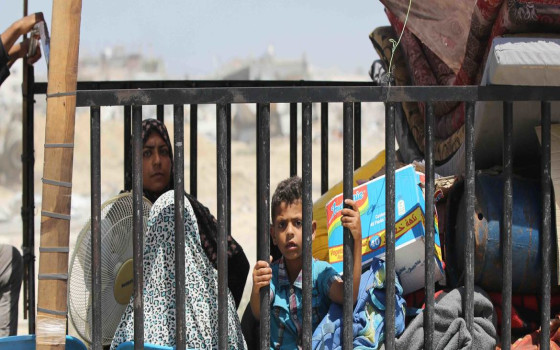
Maternal and child deaths each year: More than two million babies die in the first month of life, and 300,000 women die during pregnancy or childbirth. Women constitute 40 percent of civilians in conflict zones.

- Europe and Arabs
- Tuesday , 8 April 2025 7:5 AM GMT
New York: Europe and the Arabs
Every year, 300,000 women die during pregnancy or childbirth. More than two million babies die in the first month of life, and about two million more are stillborn. One preventable death occurs every seven seconds. In light of these statistics, the World Health Organization (WHO) launched the "Healthy Start for a Promising Future" campaign.
The campaign, launched by WHO to coincide with World Health Day on April 7, urges governments and the health community to intensify efforts to end preventable maternal and newborn deaths and prioritize women's long-term health and well-being. According to the United Nations Daily News, the organization stated that women and families everywhere need high-quality care that supports them physically and emotionally before, during, and after childbirth. It emphasized the need for health systems to evolve to manage the many problems affecting maternal and newborn health, not only complications directly related to childbirth but also mental health conditions, non-communicable diseases, and family planning. Women and Conflict
The proportion of women and girls trapped in conflict zones has increased dramatically over the past year, with women now accounting for 40 percent of all civilian deaths in armed conflict.
More than 600 million women and girls live in areas affected by violence, an alarming 50 percent increase since 2017.
Women and girls also bear a heavy mental health burden in conflict zones, including Gaza, Sudan, Afghanistan, and Ukraine, where millions suffer from post-traumatic stress disorder, anxiety, depression, and trauma, with limited access to support and care.
In Gaza, women and girls living under blockade and the constant threat of violence face extreme levels of fear, trauma, and exhaustion.
UN Women data shows that 75 percent of them suffer from regular depression, 62 percent cannot sleep, and 65 percent suffer from nightmares and anxiety, with most left to cope alone. A 27-year-old pregnant mother of three from Khan Younis said, "My mental and psychological health is deteriorating. Sometimes I go to the bathroom to cry, and I cry until I feel better." She added, "I haven't prioritized my health because I am the primary caregiver for my children, taking on the role of both father and mother."
Impact of Underfunding
The UN Refugee Agency (UNHCR) reported that the current humanitarian funding crisis, exacerbated by declining health spending in host countries, is affecting the scope and quality of public health and nutrition programs for refugees and host communities.
In Jordan, for example, 335,000 women of reproductive age are at risk of losing essential maternal health services. Without adequate funding, antenatal care, safe delivery, and newborn health services will disappear.
In Bangladesh, approximately one million Rohingya refugees face a severe health crisis due to a funding freeze, threatening their access to essential medical services. In programs supported by the United Nations High Commissioner for Refugees (UNHCR), more than 40,000 pregnant women could lose access to essential antenatal care, with 5,000 at risk of giving birth in unsafe conditions.
One death every two minutes
Another UN report, "Trends in Maternal Mortality," showed a 40 percent global decline in maternal deaths between 2000 and 2023, largely due to improved access to basic health services.
However, the report—produced by several UN agencies—reveals that the pace of improvement has slowed significantly since 2016, and that an estimated 260,000 women will die in 2023 as a result of complications during pregnancy or childbirth, roughly equivalent to one maternal death every two minutes.
The UN agencies said this report comes as cuts in humanitarian funding are severely impacting essential healthcare in many parts of the world, forcing countries to cut back on vital maternal, newborn, and child health services. The report warned that if urgent action is not taken, pregnant women in many countries will face dire consequences, particularly in humanitarian settings where maternal mortality rates are already alarmingly high.
A Necessity, Not a Luxury
UN Women emphasized that for women and girls in conflict zones, mental health care is a critical need, not a luxury. Recovery, dignity, and survival depend on access to trauma care, psychological counseling, and community-based services.
It added that as conflicts continue to devastate communities, the need for mental health support is more urgent than ever.
It emphasized the need for countries to invest in mental health as a core part of the humanitarian response, particularly in conflict settings, calling on governments to listen and act.












No Comments Found